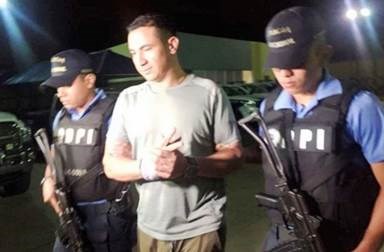A man who has spent one year inside a prison without access to proper nutrition, medical care, prescriptions, clean water, sunlight, and regular visits with his wife and family has a message for anyone who is listening.
“Let’s build a better world,” wrote Edwin Espinal from a high-security, military-run prison in Honduras called La Tolva where he has been incarcerated for more than a year without a trial.
This is the only the second time in a year Espinal has been able to share anything with the world beyond what he can tell his family and lawyer on the occasions they are allowed in to see him.
Espinal and Raúl Eduardo Álvarez are in prison together, both arrested following mass political protests, and both considered political prisoners. Neither has had a trial.
“Raul and I think this place [La Tolva] and the conditions of living are made with the purpose to let prisoners kill each other,” wrote Espinal, referencing an earlier riot that left two dead and 17 injured. Despite the security cameras, no one was ever charged in connection to the riots. “This has been 12 months of constant stress and a very scary environment where we have no idea how much longer we will survive this.”
Since 2009, Espinal has played an active role in advocating for human rights in Honduras. In Nov. 2017, an election fraught with allegations of corruption spurred a mass of protests as hundreds of thousands of Hondurans marched in protest of the government. A state of emergency was declared and the military and police dispersed protesters and imposed a curfew. Several protesters were killed and thousands arrested.
On Sunday, a group of people gathered at Elmvale Community Hall, where the Spring family and the Simcoe County Honduras Rights Monitor held a meeting to mark a full year of efforts to push the Canadian government to intervene and the Honduran government to release Espinal, Alvarez and all the other political prisoners arrested during nationwide protests.
Karen Spring, Espinal’s wife, and a former resident of Elmvale (her parents still live there) joined the meeting via video call from her home in Honduras. She said there were more protests in the streets on Sunday.
“Two more caravans have left Honduras,” said Spring. Those caravans are the same being detained at the Mexico/US border. “There’s a significant crisis still ongoing, and for people who stay, the resistance and protests are still very strong.”
Jan. 27, 2019, was the one-year anniversary of the inauguration of Honduras’ president Juan Orlando Hernández, and Hondurans organized mass protests, some shouting “get out J.O.H.” (referring to Hernández) according to international media reports.
Spring said one of the other demands by the protesters is to release political prisoners like Espinal.
Espinal confirmed the prison is overcrowded, there are no ways for prisoners to contact families or authorities from the prison, and since there’s no room in the dining hall, prisoners eat their meals in bed, next to a dirty toilet filled with raw sewage. Water delivery is scarce, and they don’t get water to flush the toilet until after lunch.
Espinal had an ear infection for two months before he received medicine for it. He has still not regained hearing in his left ear.
“It is so sad to beg for a headache pill and get a negative answer, but when we protest, we get enough tear gas to make our health problems much worse,” said Espinal. “I’m not surprised by all of this as it’s the same situation here or out there.”
He’s found a group of about 10 people in the prison who want to learn to read and write, so he works on teaching them. But he has only one pen, and the prisoners will often run out of toilet paper to use for writing.
“Jail instead of schools, weapons instead of medicine, bullets instead of books,” said Espinal. “Just makes our world more unsafe. Let’s build a better world. Ask your government to stop supporting dictatorships.”
The case of Espinal and the pleading of the Spring family hasn’t moved the Canadian government to step in. In fact, after several visits to Ottawa, Janet Spring, Espinal’s mother-in-law, hasn’t been able to get a meeting with either the Prime Minister or Canada’s minister of global affairs, Chrystia Freeland. They have met with a Global Affairs aid.
Grahame Russell, is a director at Rights Action, a non-profit group advocating for human rights in Honduras and Guatemala. Russell knows Espinal, and was at the Elmvale meeting on Sunday.
“[Espinal] is being made an example of,” said Russell. “He’s known around the country as a human rights defender.”
The non-practicing Canadian lawyer said Espinal’s case is a window into how hard it is for Hondurans to live under the current government and in the conditions imposed by Honduran military and police. Canada, he said, has been propping up the government through a foreign policy that disregards human rights for the sake of economic gain.
“Since 2009, Canada is completely on the wrong side of this,” said Russell, adding Canada is aware of human rights abuses, and is choosing to stay out of them.
“The Oligarchs that run Honduras are responsible, our issue is that we go along with it,” said Russell.
Russell and Spring encouraged the crowd to keep putting pressure on the Canadian government to recognize the human rights abuses happening in Honduras, in particular to Edwin Espinal, and to push the Honduran authorities to show more respect for human rights, beginning with the release of Espinal, Alvarez and the other political prisoners being held illegally and in deplorable conditions.
To learn more about how to get involved, or to sign a petition, click here for the Simcoe County Honduras Rights Monitor website.


